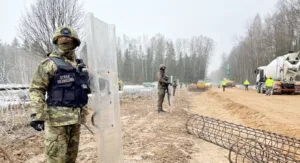Brussels – It has been a three-years-long story, with two successive governments of different colours on this front. But the result has not changed; on the contrary, Poland’s migration policy along the border with Belarus has, if possible, even worsened from the ultraconservative government of Mateusz Morawiecki to that of the centre-right popular Donald Tusk. In fact, the latest political news from Warsaw is not only the reintroduction of a media and human rights organisations exclusion zone from a border strip with Belarus but also a new law that exempts law enforcement officials from liability when they use weapons in “self-defence” or “preemptively” against migrant people in the border area.

Following the alarm launched by several nongovernmental organisations such as Amnesty International, five Democratic Party MEPs who are members of the Committee on Civil Liberties, Justice and Home Affairs (LIBE)—Sandro Ruotolo, Marco Tarquinio, Cecilia Strada Pina Picierno and Alessandro Zan—have submitted a written question to the EU High Representative for Foreign Affairs and Security Policy, Josep Borrell, asking “what measures he intends to take to prevent human rights violations against migrants at the Polish-Belarusian border.” As stated in a note from the Dem delegation, the five members of the European Parliament point the finger at the law passed in late July that targets migrants “attempting to cross the border in the so-called ‘death zone’, a buffer zone that prohibits access to humanitarian groups, human rights monitors and media at the border.”
It has been since the summer/autumn of 2021 that the situation along the Polish-Belarusian border has been tense, ever since the self-proclaimed Belarusian President, Alexander Lukashenko, had implemented a policy—described as “hybrid warfare” by all EU institutions—to actively facilitate travel for citizens of Middle Eastern countries and from sub-Saharan Africa to Minsk and from there to EU borders. The “instrumentalisation of migration” theme has become so present in the EU narrative on migration that it has become a legislative piece of the new Migration and Asylum Pact. At the same time, it has also led to the increasing construction of walls along the EU’s external border by member countries (not only Poland but also Estonia, Lithuania, Latvia, and Finland). The Polish one is a wall 186 kilometres long, 5.5 meters high and equipped with motion detectors and thermal cameras. Warsaw, in recent years, has also sent thousands of troops and police officers to strengthen the control of the area. In this context, as early as 2021, with the state of emergency, a three-kilometer-wide strip of land had been closed to journalists and NGOs monitoring the pushbacks (illegal rejections of people entitled to international protection at the borders of the European Union) carried out by Polish forces, as blatantly demonstrated on November 16, 2021.
 Now, “the situation seems to be exacerbated by domestic political propaganda that considers migrants a threat to national security and decriminalises and justifies violent and non-proportional behaviour,” is the complaint put in black and white by the PD MEPs. The bill was introduced last June 26 in response to the detention of three Polish soldiers who, after firing at people crossing the border with Belarus illegally, were accused of overstepping their duties and endangering the lives of others.
Now, “the situation seems to be exacerbated by domestic political propaganda that considers migrants a threat to national security and decriminalises and justifies violent and non-proportional behaviour,” is the complaint put in black and white by the PD MEPs. The bill was introduced last June 26 in response to the detention of three Polish soldiers who, after firing at people crossing the border with Belarus illegally, were accused of overstepping their duties and endangering the lives of others.
It is no coincidence that the law now justifies the use of weapons when the “life, health, and liberty” of law enforcement officers “are threatened during an unlawful attack on the inviolability of the state border,” with the Tusk government using the well-established argument of “the instrumentalisation of migration” to justify the illegal refoulement of persons with the right to international protection and other physical violence. However, “the invocation of national security cannot serve as a ‘carte blanche’ to take measures that are not compatible with the minimum standards of international humanitarian and European law,” the members of the PD delegation write again to High Representative Borrell, referring to Amnesty International’s complaints that the new law—combined with the exclusion zones—constitutes a risk of a physical and legal grey zone hidden from the eye of the media and civil society, where Polish soldiers can act with impunity violating every provision of the rule of law.
English version by the Translation Service of Withub





